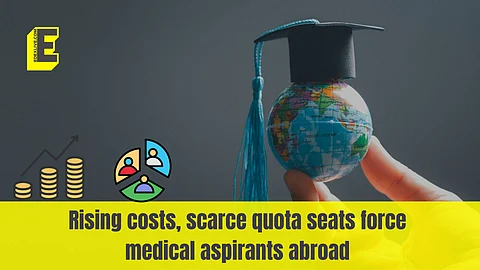

For thousands of aspiring doctors in Andhra Pradesh, studying medicine abroad is becoming less of a choice and more of a necessity. Despite a steady rise in MBBS seats in India, the growing dominance of private medical colleges and skewed seat allocations have made affordable medical education elusive — especially for middle-class families.
Parents and students are raising concerns about the limited availability of *convener quota* (Category A) seats in private medical colleges, which are priced reasonably. According to the National Medical Commission (NMC), 35% of seats are reserved under the *management quota* (Category B), and 15% under the *NRI quota* (Category C), leaving fewer affordable options for deserving students.
Dr. Veena Baddipudi, a native of Chirala in Bapatla district, who completed her MBBS from Sichuan University in China, told The New Indian Express, “Though I got a dental seat in Andhra Pradesh, I wanted to pursue medicine. I went to China in 2007 and completed my MBBS by 2012. Students must choose only universities approved by the Indian Embassy, as the approved list changes annually. After returning, I had to clear the Foreign Medical Graduate Exam (FMGE) and undergo a two-year internship.”
Parents like Maridu Madhavi from Hanuman Junction in Eluru district echoed similar concerns. Her daughter, Dr Tejasri, studied medicine in Mauritius. “We couldn’t afford a management seat here. Studying abroad cost us 20–30% less. But now my daughter has to clear the FMGE. She missed the pass mark by one in two attempts. There’s no answer key or revaluation option. It’s unfair and unclear,” she said.
Safety concerns during global crises — like COVID-19, the Russia-Ukraine war, and Iran-Israel tensions — have heightened worries about studying abroad. Yet for many, the domestic cost barriers leave them with no alternative.
“Medical education has become a nightmare for the middle class,” said Dr MV Ramanaiah, State President of Prajarogya Vedika, an NGO. “The WHO recommends one doctor for every 1,000 people. To meet that, the Centre planned one medical college per parliamentary constituency. While Andhra Pradesh was sanctioned 17 colleges, due to funding issues, the state is opting for Public-Private Partnership (PPP) models. This will drastically cut down the convener quota seats.”
Dr Ramanaiah warned that over 1,000 affordable seats could be lost in Andhra Pradesh under the PPP model, pushing more students to study abroad and join the long list of FMGE aspirants struggling to qualify for practice in India, according to the repot by The New Indian Express.
With mounting pressure, students, parents, and public health advocates are calling for increased convener quota seats, reduced management seat fees, and a transparent, fair FMGE process. Until these reforms take shape, for many, the road to becoming a doctor still runs through foreign shores.
